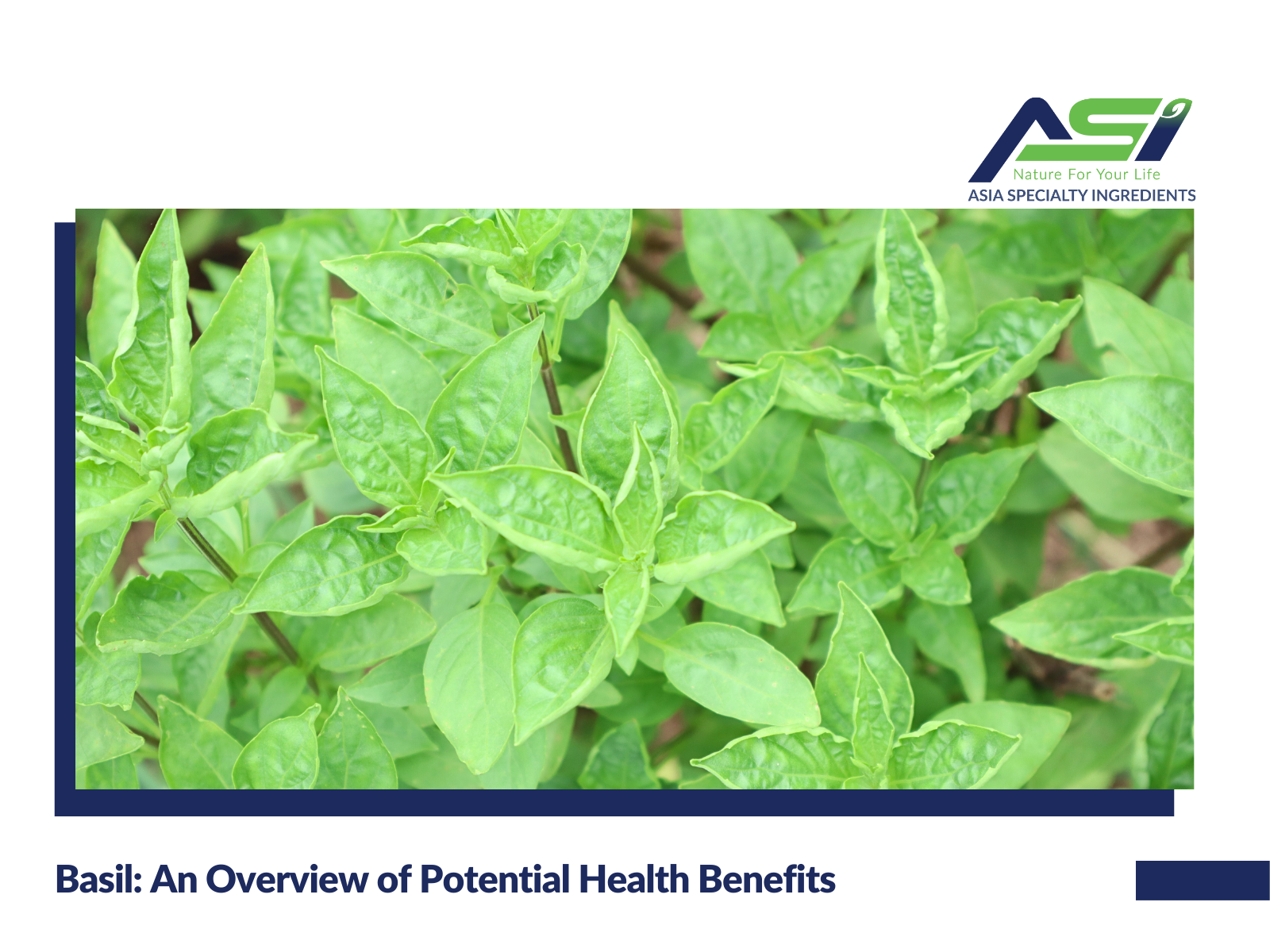Basil, a fragrant herb widely used in culinary dishes around the world, is more than just a flavorful ingredient; it also offers a range of potential health benefits. Known scientifically as Ocimum basilicum, the herb is rich in essential oils, vitamins, and antioxidants that contribute to its therapeutic properties. From reducing inflammation and boosting immunity to improving digestion and supporting heart health, this herb has been recognized in traditional medicine for its healing qualities.
This article will explore the various health benefits associated with basil, shedding light on how this versatile herb can enhance both diet and well-being.
Table of Content
ToggleAn overview of basil
Basil is an aromatic herb that includes many species in the genus Ocimum L. (Lamiaceae). More than 15 varieties with different flavors, colors and leaf shapes have been identified with designations including cinnamon, Genovese, sweet, Greek, lemon, and purple basil, to name a few. The herb is widely grown in Asia, Africa, South America, and the Mediterranean.
Common leaves have had culinary importance for centuries. Several Ocimum species are used in Ayurvedic and other traditional medicine systems.
The dried and fresh leaves season tomato dishes, vegetables, fish, meat, soups, and so on. The essential oils and aromatic extracts from Ocimum varieties are also important components of dental products, pharmaceuticals, cosmetics, and flavoring agents.
Most common health benefits of basil plants
Basil, a fragrant and versatile herb commonly used in culinary dishes around the world, is not only celebrated for its delightful flavor but also for its numerous potential health benefits that contribute to overall well-being. Here are some of the key benefits:
-
Reduction of oxidative stress
The herb is rich in antioxidants, which play a significant role in combating oxidative stress. Oxidative stress occurs when there is an imbalance between free radicals and antioxidants in the body, leading to cell and tissue damage. This imbalance is associated with various chronic diseases, including cancer, heart disease, and diabetes.
The antioxidants in basil, such as eugenol, rosmarinic acid, and linalool, are particularly effective at neutralizing free radicals. Eugenol, found in sweet basil, has been shown to have strong antioxidant properties that help protect cells from oxidative damage. Rosmarinic acid, present in both sweet and holy basil, is another potent antioxidant that helps reduce inflammation and supports overall cellular health. Linalool, found in lime and lemon basil, also contributes to the plant’s antioxidant capabilities.
2. Blood sugar regulation
This plant is highly effective in managing blood sugar levels. Numerous studies, including those on animals, human clinical trials, and diabetic patients, have shown its ability to lower blood glucose and improve glucose regulation.
It also protects vital organs like the liver, kidneys, and pancreatic islet cells from damage caused by high glucose levels. By boosting insulin secretion and action, reducing cortisol levels, and decreasing inflammation, the herb provides a comprehensive approach to managing diabetes and maintaining optimal blood sugar control.
-
Improves immune system function
The immune system is a complex network that requires proper regulation to function optimally. Basil has been found to possess immune-modulating effects, meaning it can help balance and strengthen the immune response. Studies have shown that compounds in basil can regulate the production and activity of immune cells, such as lymphocytes and macrophages, leading to a more robust immune defense against infections and diseases.
The herb is also well-known for its antibacterial qualities. Research indicates that basil extracts can combat a variety of bacterial strains, including those responsible for foodborne illnesses, respiratory infections, and skin infections. The active compounds in basil have been shown to prevent the growth and spread of harmful bacteria. Adding the herb to your diet may enhance your immune system’s ability to fend off bacterial infections.
-
Boost your mood
The plant positively influences brain chemicals that are essential for mood regulation. Studies indicate that the herb contains compounds capable of boosting serotonin production, a neurotransmitter often referred to as the “feel-good” hormone. Serotonin is known to enhance mood, foster a sense of well-being, and alleviate symptoms of depression. By adding basil to your diet, you may increase serotonin levels in your brain, leading to an improved mood and overall sense of happiness.
In our fast-paced and stressful world, it’s crucial to find natural methods to manage and reduce stress for good mental health. Basil has demonstrated stress-reducing properties. The herb contains compounds like eugenol that help the body adapt to stress and restore balance. Its aroma can calm the mind and body, easing stress and anxiety.
-
Memory Enhancement
Memory retention is essential for everyday tasks, learning, and recalling information. Basil is known to enhance memory. It contains antioxidants that protect brain cells from oxidative stress and damage, which can cause memory decline. Additionally, the essential oils in basil have been shown to improve memory retention and retrieval.
As we age, it’s common to experience a decline in memory and cognitive function. However, incorporating basil into your daily routine may help mitigate this decline. Research suggests that the antioxidant properties in the herb can protect the brain from age-related damage, reducing the risk of cognitive decline and neurodegenerative diseases such as Alzheimer’s.
Read more: Multifaceted applications of basil oil
Conclusion
In conclusion, basil is not only a culinary delight but also a powerful herb with numerous potential health benefits. Its rich composition of essential oils, antioxidants, and nutrients makes it a valuable addition to any diet, offering support for heart health, immune function, and inflammation reduction. The herb’s traditional use in herbal medicine is backed by modern research, which continues to uncover its potential in managing various health conditions.
Asia Specialty Ingredients (ASI), part of Asia Ingredients Group (AIG), specializes in the production and global export of essential oils and natural aromatics. Our range of products is meticulously processed using only the finest natural ingredients sourced from the typical lands of Vietnam, including Cassia, Basil, Star Anise, and more, ensuring good product quality. Contact us for more collaboration opportunity!








